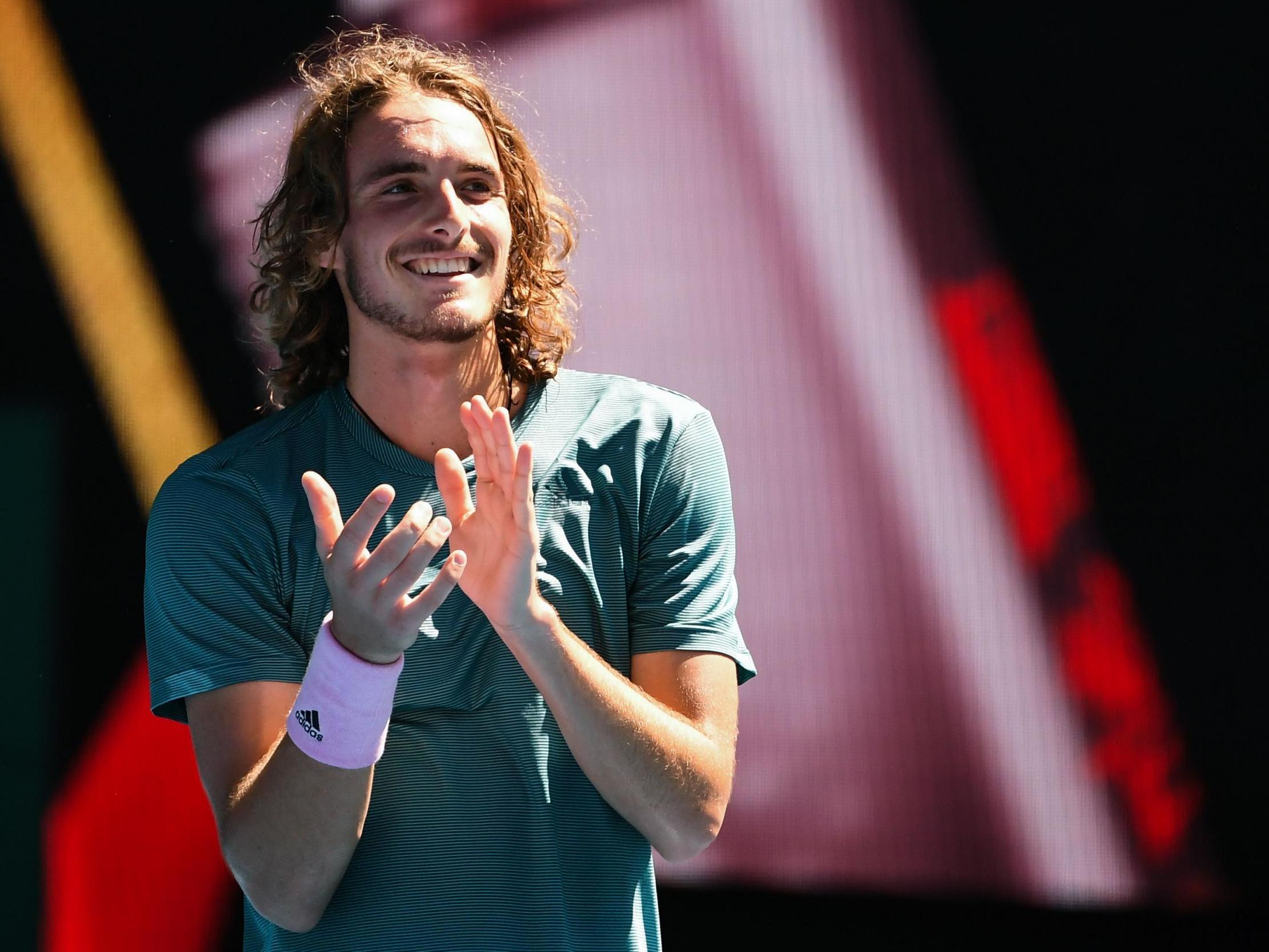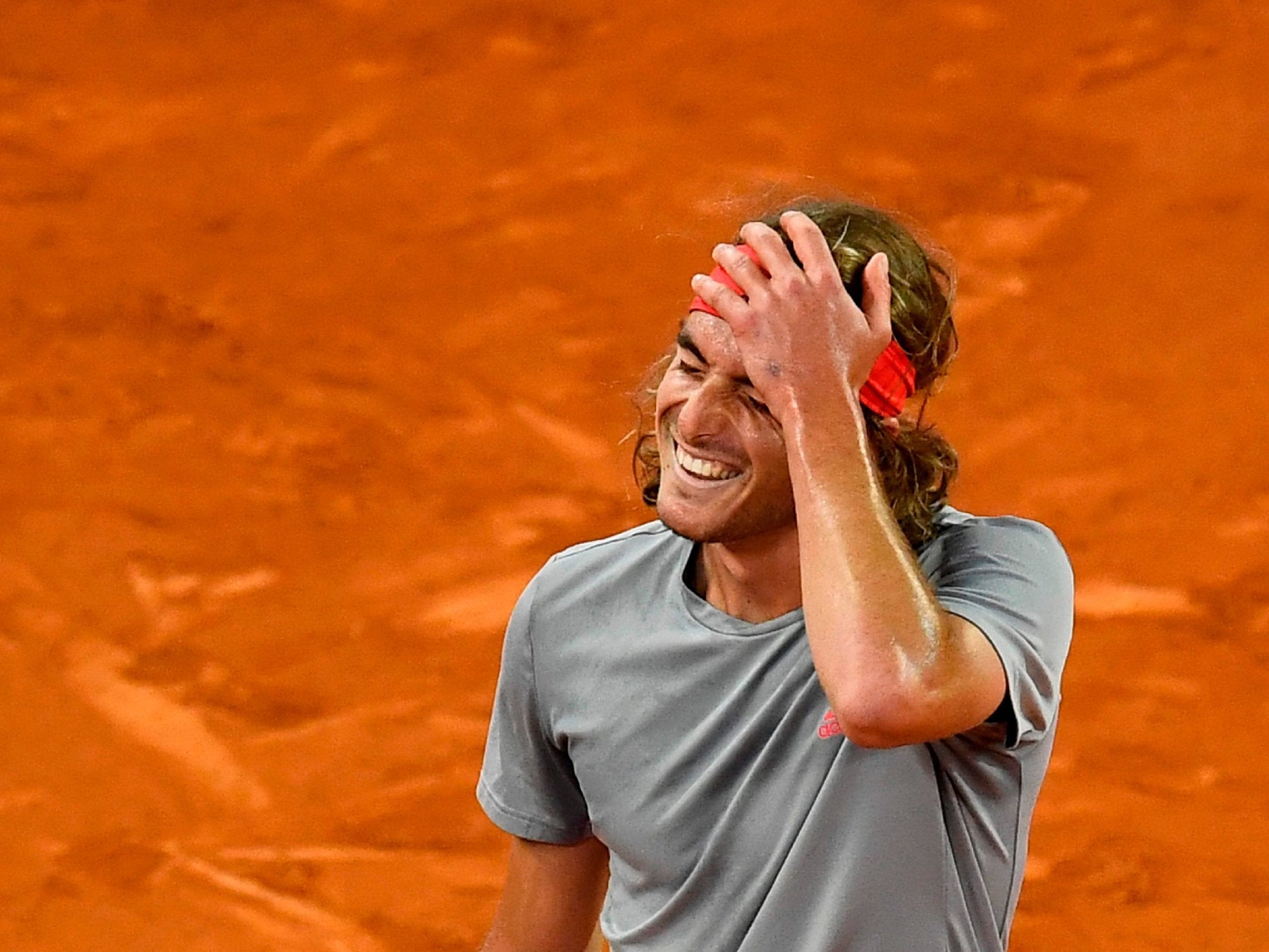Stefanos Tsitsipas: Tennis’ newest rock star set to storm Wimbledon playing to his own tune
EXCLUSIVE INTERVIEW: The young Greek has emerged as one of the world’s best young players after a run to the semi-finals at this year’s Australian Open
A year can be a long time in tennis. Twelve months ago Stefanos Tsitsipas arrived at Wimbledon having won just one of the five matches he had played in Grand Slam tournaments, but at the All England Club next week the 20-year-old Greek will be the player perhaps most likely to break the stranglehold of the “Big Four” on the sport’s major prizes. It is now 17 years since anyone other than Roger Federer, Rafael Nadal, Novak Djokovic or Andy Murray won Wimbledon.
In his short time on the tour Tsitsipas has already beaten Federer, Nadal and Djokovic – he has yet to play Murray – and quickly become the hottest property in tennis. The world No 6’s dynamic attacking game, which features a majestic one-handed backhand, has been thrilling crowds the world over for the last 18 months, while his flowing hair and rock star looks draw frequent comparisons with Bjorn Borg.
Within the sport Tsitsipas has a reputation as something of a loner, but he loves having a direct connection with his fans, often through his personal YouTube channel, where he indulges his love of photography and film-making.
Having such a high profile would overwhelm many a player of a similar age, but Tsitsipas, who is the youngest man in the world’s top 20, has his own ways of dealing with pressure.
“It’s something that I’ve perfected since a young age,” Tsitsipas told The Independent. “My parents and my coaches always told me that I should never look at what’s happening around me. I think Naomi Osaka once said in an interview – and I totally agree with her – that you just have to do your own thing, forget about the people around you, distractions, players yelling at the umpire, or whatever and just concentrate on what you’re doing.
“I sometimes see myself on television and I do feel like I’m sometimes too much in my bubble. But for me that helps me to play my best tennis. If I just stared around like some other players do I couldn’t perform at the same level, so it’s how it works for everyone.”
At the start of 2018 Tsitsipas was ranked No 91 in the world. By the end of it he had won his first tour-level title, reached two Masters Series finals, beaten Djokovic and broken into the world’s top 15. Even bigger breakthroughs have followed as Tsitsipas knocked Federer out of this year’s Australian Open, where he eventually reached the semi-finals, beat Nadal in Madrid and climbed to a career-high position at No 6 in the rankings.
Tsitsipas said his exploits in Australia had changed the way both players and spectators view him. “I would probably say that players do respect me a little bit more because I can feel that on the tennis court when I play them,” he said.
“But I notice more of a difference with the public than the players. People recognise me more and have a better connection with me, probably through the hobbies that I like to share with an audience. That gives people an opportunity to get to know me a little bit better.”
Younger players have found it hard to make their mark in recent years, but there are currently four under the age of 21 – Tsitsipas, Felix Auger-Aliassime, Denis Shapovalov and Alex de Minaur – in the world’s top 30. Tsitsipas, who won last year’s Next Gen Finals in Milan, has emerged as the standard-bearer for the young pretenders.

“I always wanted this to happen as early as possible, to take advantage of all the hard work I’ve been putting in all these years,” he said. “I think I deserve this spot and I think it’s great that I’m doing it at such a young age. I’m not having to play all these small events – Challengers, Futures. It’s really tough when you get stuck there, so I’m really happy that I’m playing the best tournaments in one of the best cities in the world every single week. I get to play in front of big crowds most of the time.
“It’s great to have young players who can prove themselves and can get plenty of new fans and basically add variety to the tour. People want to see new things. People want to see young players come out and play interesting tennis.”
Being Greek adds to the mystique and charm surrounding Tsitsipas, who speaks very good English. He is based at Patrick Mouratoglou’s academy in the south of France, where he is still coached by his father, Apostolos. His success, combined with that of his compatriot Maria Sakkari, has ignited major interest in tennis in Greece, a country without any great traditions in the sport.
“I haven’t been home [to Greece] since November so I don’t know how people would treat me if I went there,” Tsitsipas said. “But I think more people know who I am, for sure, and realise what I have done until now. It’s big for the country, it’s big for the sport in the country.
“I’m very happy if I’ve made people very happy and satisfied and made them dream of things that they never expected a Greek could achieve in this sport. That makes me really happy and puts a smile on my face when I see their reactions and see their comments, when I see what they have to say on social media.”
Tsitsipas is a quick learner who talks with great respect for the generation of champions he is trying to usurp. If he could take one quality from each of the game’s top three what would they be?
“The spirit of Nadal, the serve of Federer and the backhand of Djokovic,” Tsitsipas replied. “Djokovic is one of the best baseliners I’ve ever seen. Nadal with the energy, the amount of effort and the fighting spirit that he puts on the court, you can just take that and work on that, though I don’t know how much you can work on that because not many players are born with this. Sometimes you just have to be born like this and get into this mindset from a young age. Federer just plays unteachable tennis – I would call it nature’s gift.”
However, Tsitsipas insisted: “I have my own personality. If I want to try to do what Nadal does – or Federer or Djokovic – then that’s not me. I would just be trying to be a copy of somebody else, which I hate, because then I don’t create my own image, my own style.”

Tsitsipas’ aptitude for grass was evident last summer as he made the fourth round at Wimbledon before losing to John Isner. This year he lost first time out to Nicolas Jarry at ’s-Hertogenbosch but won two matches at last week’s Fever-Tree Championships before losing to Auger-Aliassime. He was suffering with a sore shoulder at Queen’s but is hoping to be fully fit for only his third appearance at Wimbledon.
Wherever he goes Tsitsipas usually takes time out to take photographs or shoot videos, but for the next fortnight it seems that he will be focusing on his tennis. Asked last week if there was anything he particularly wanted to see in London, he could think only of November’s Nitto ATP Finals, which will bring together the year’s eight most successful players. “I would love to see myself playing at the O2 Arena,” Tsitsipas said with a smile. “That’s something I want to see in London.”
Join our commenting forum
Join thought-provoking conversations, follow other Independent readers and see their replies
Comments
Bookmark popover
Removed from bookmarks